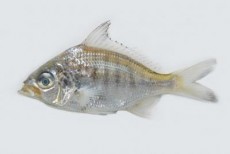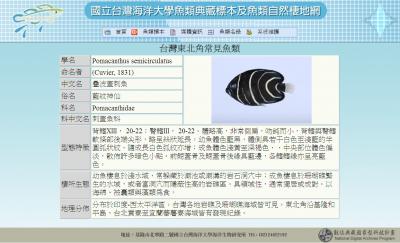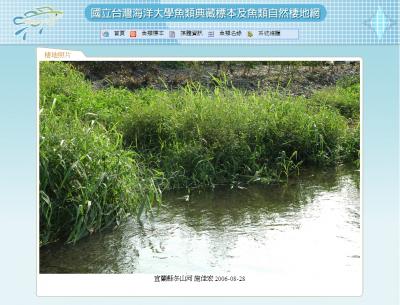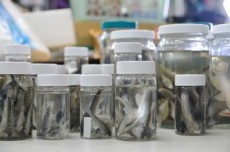|
 “Fish, fish swimming in the water” is a line from a song we are all familiar with from when we were young, a song we have hummed and sang the words to countless times. The children who sing the song inevitably grow up but every time they pass by a river or swamp or leap into the blue ocean they will always hear this relaxing rhythm once again in their heads. Who knows the differences between these fish in the rivers and in the deep blue ocean? Who knows their habits and can call out their names on sight? Who can more people understand fish and their habitats? National Taiwan Ocean University has established the “Digifish” fish specimen and fish habitat web with the aim of collecting together information about the fish of Taiwan and Southeast Asian together using a databank method. The “National Taiwan Ocean University Freshwater and Seawater Fish Specimen and Natural Habitat Information Digital Archives Program” team led by professors Chen Yi-hsiung and Chen Hong-ming have, after two years of effort, collected more than 5000 specimens. When a user clicks on a fish or searches for one he/she will see its scientific name, Chinese name, morphological characterization, habitat, geographical distribution and specimen photograph, making the web like a fish encyclopedia that allows researchers to compare fish and provides valuable reference material. “In the past some amateur fish “experts” would tell other people who shared their interest in fish what kind of fish they had seen and sometimes would write to us for confirmation but, from the information provided, we couldn’t always be sure of being correct. Now with this system, which is easy to use, we are able to provide accurate information quickly” said Professor Chen Yi-hsiung who thinks that, in the past, researchers had lots of information but nowhere it could be made available for the public to access and also no way to link it with the information in other research information system. This databank serves as a platform that, using the borderless features of the Internet, makes first-hand information available to researchers and members of the general public easily.
“Fish, fish swimming in the water” is a line from a song we are all familiar with from when we were young, a song we have hummed and sang the words to countless times. The children who sing the song inevitably grow up but every time they pass by a river or swamp or leap into the blue ocean they will always hear this relaxing rhythm once again in their heads. Who knows the differences between these fish in the rivers and in the deep blue ocean? Who knows their habits and can call out their names on sight? Who can more people understand fish and their habitats? National Taiwan Ocean University has established the “Digifish” fish specimen and fish habitat web with the aim of collecting together information about the fish of Taiwan and Southeast Asian together using a databank method. The “National Taiwan Ocean University Freshwater and Seawater Fish Specimen and Natural Habitat Information Digital Archives Program” team led by professors Chen Yi-hsiung and Chen Hong-ming have, after two years of effort, collected more than 5000 specimens. When a user clicks on a fish or searches for one he/she will see its scientific name, Chinese name, morphological characterization, habitat, geographical distribution and specimen photograph, making the web like a fish encyclopedia that allows researchers to compare fish and provides valuable reference material. “In the past some amateur fish “experts” would tell other people who shared their interest in fish what kind of fish they had seen and sometimes would write to us for confirmation but, from the information provided, we couldn’t always be sure of being correct. Now with this system, which is easy to use, we are able to provide accurate information quickly” said Professor Chen Yi-hsiung who thinks that, in the past, researchers had lots of information but nowhere it could be made available for the public to access and also no way to link it with the information in other research information system. This databank serves as a platform that, using the borderless features of the Internet, makes first-hand information available to researchers and members of the general public easily.

“Digifish” fish specimen and fish habitat web

The Dongshan River in Yilan.

Digifish provides anyone interested in fish with complete and detailed information. This is a spotted green goby (Acentrogobius viridipunctatus) collected at Keelung.
Prof Chen Yi-hsiung went on to say that every specimen in the collection has been carefully categorized and named before entering the databank, the objective being to make the information as reliable and correct as possible. Researchers and members of the public aren’t the only ones who can use the material in the databank, it can also be used by media and documentary filmmakers, giving it a public information and education role.
Principal investigator Prof. Chen Hong-ming is an expert in moray eels, eels and coral reef economic fish. He joked about the other Professor Chen, “I’m in charge of the small fish, he’s in charge of the big fish.” The “two Chens” have many stories of the hardships they have endured as they have collected specimens for this program. Researchers whose research area is living creatures or related to ecology often have to face various dangers and unknowns as they seek to add to their specimen collection, venturing to places where others rarely go, under the scorching sun or in the bone-chilling wind, all in a day’s work. One worry they always have is that they will be injured in a remote place with no-one to help or will delay seeking medical treatment because they don’t understand the serious of their injury or illness. Said Chen Hong-ming, “I was once in the wilds near Sanxiantai in Taidong carrying out a fish survey by night and I was bitten by a venomous snake on the seashore, leaving my calf as swollen as a sausage. It took one hour to rush me to hospital in Taidong. All I could do was give a vague description of the snake’s markings and wasn’t even sure if the anti-venom serum was the right one.” While Prof. Chen talks about the incident like it was a big outdoor adventure he actually was in danger of losing his life.Prof. Chen Yi-hsiung also told how he was once in pursuit of a rare fish and swam down to a depth of 40 meters when he suddenly was shocked to find he had run out of oxygen, forcing him to get back to the surface as quickly as possible. The stories of danger told by these researchers may scare us but to them their work is just “Walking alone at the front just to “find something new”.
 After collecting a specimen it has to be carefully handled. The specimen that was probably collected after researchers traveled a long way and with a lot of effort is carefully packaged to protect it so it arrives at the laboratory undamaged.
After collecting a specimen it has to be carefully handled. The specimen that was probably collected after researchers traveled a long way and with a lot of effort is carefully packaged to protect it so it arrives at the laboratory undamaged.
Its characteristics, place it was collected, habitat are recorded and the specimen is given its own number to allow convenient comparison and management in future. The careful treatment given the specimens shows how precious they are to those that collect them. Prof. Chen Yi-hsiung who worked at National Museum of Marine Biology and Aquarium for nine years, was involved in fish specimen digital archiving work at the time. Now, with the support of “National Taiwan Ocean University Freshwater and seawater fish specimen and natural habitat information digital archives program” the platform technology has been standardized and the information of numerous fish species completely established. At present Digifish has 900 pieces of specimen information, 49 ecological photographs, 10 ecological films and natural habitat films, 50 specimens of fish common on the northeast coast of Taiwan, 30 images focused on the sensory canals of gobies found in Taiwan and 250 images of members of Family Gobioidei from Singapore’s Raffles Museum. Prof. Chen hopes to be able to provide a fish gene bank search function in future and integrate the research of other Southeast Asian countries to form a large Southeast Asia fish data bank that will give researchers, students and members of the public in Taiwan easy access to accurate and useful information.
In recent years, damage inflicted by humans on the natural environment means that the speed of habitat loss is accelerating. As they collect fish specimens the two professors feel these enormous changes firsthand. “Some fishermen I know tell me that it’s getting harder and harder to catch fish because some fishermen use three layer nets that catch all fish large and small, which is really bad” said Prof. Chen Hong-ming. Actually, although many people know that this overexploitation is wrong this kind of thing still happens because there is no easy way at the present to gain economic benefit and protect the natural environment at the same time. Maybe by circulating the fish and fish habitat knowledge in this databank a contribution to ecological education can be made, changing how people think about the environment.
To understand fish you must also understand the natural environment because the two are inseparable. As we sing “Fish, fish swimming in the water” our rivers are being heavily polluted, habitats vanishing and endemic species disappearing with them. Knowledge and information are the foundation stones of conservation work and we need to understand the symbiotic relationship between various species and their natural environment. Hopefully, by spreading knowledge through digifish, people’s conservation awareness will be awakened, they will appreciate the beauty of fish and understand the importance of fish conservation and ecological conservation in general.
Reference website: http://digifish.biodiv.tw/ (fish specimen and fish natural habitat web)
Text and films are provided by TELDAP e-Newsletter (June, 2011)
|

















